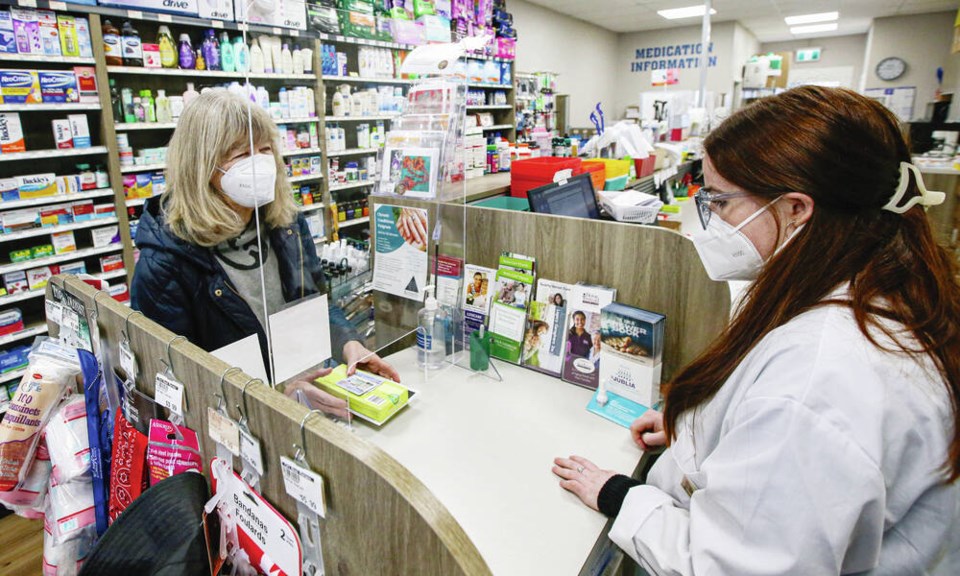B.C. will add 128 new medical school seats and allow pharmacists to renew and prescribe some medications as part of a strategy to tackle the labour shortage in health care.
The 70 actions unveiled by B.C. Health Minister Adrian Dix on Thursday are set to roll out over five years. The measures are aimed at recruiting and retaining health-care workers and redesigning the system to expand existing roles.
Beginning Oct. 14, the province’s 6,500 registered pharmacists in about 1,300 locations will be allowed to administer and refill for up to two years a wider range of prescriptions for people with chronic conditions who can’t access a family doctor.
If there’s any concern about renewing a patient’s prescription, pharmacists can seek advice from a prescriber through the Health Ministry, a process that may result in the patient’s referral to a physician.
By the spring — after a series of consultations — pharmacists will be able to prescribe medications to patients without a family doctor for less-acute ailments such as allergies, indigestion, urinary-tract infections and acne, and for those seeking contraception.
The goal is to alleviate the burden on emergency rooms and the primary-care system and assist people with chronic conditions who, for instance, have lost their primary-care provider or have moved here from another province and have run out of their prescription drugs, said Dix.
B.C. Pharmacy Association president Jamie Wigston, a pharmacist in New Westminster, said pharmacists will not need to upgrade their training to take on the new tasks.
Wigston said the change is especially important for individuals with a mental-health disorder who need medication “in a timely and critical manner,” and will also help people in small towns where the local doctor may be hours away on a call but a community pharmacy is available.
Vikram Bawa, owner of Fort Royal Pharmacy in Oak Bay and Victoria, has waited years for an expansion of pharmacists’ role, saying B.C. is lagging behind provinces such as Alberta, Manitoba, New Brunswick, Nova Scotia, Quebec and Saskatchewan, where pharmacists can initiate prescriptions.
Bawa said seniors who have lost their family doctor and are desperate for a prescription refill are becoming commonplace at his pharmacy. Many prescriptions need to be renewed by a physician every six months, but an estimated one million people in B.C. and as many as 100,000 in southern Vancouver Island don’t have a family doctor.
“It’s a huge stepping stone in the pharmacy world,” said Bawa. “COVID has shown we’re a reliable source because it allowed us, when doctors weren’t available, to provide patients with a prescription refill or emergency supply of their medications if needed.”
As part of its 70-point action plan, the province also plans to expand training seats in the UBC Faculty of Medicine — the 128 annual seats include 40 undergraduate and 88 postgraduate. Forty family medicine residency positions will be phased in over two years beginning in the fall of 2023.
An additional 48 residency positions to accommodate the expanded undergraduate program will be phased in by fall 2028.
The province has also provided $1.5 million to Simon Fraser University to help establish a second medical school in Surrey.
In the coming weeks, Dix said, there will be more announcements about simplifying the process of accreditation for internationally educated health professionals applying to work in B.C.
The province also plans to put in place permanent regulations to expand the role of paramedics and first responders to alleviate pressure on the health-care system.
For paramedics, that means enhancing their airway-management skills and providing expanded life-support and pain-management procedures.
For other first responders, it means additional diagnostic testing, such as blood-pressure and blood-glucose monitoring, administering epinephrine for life-threatening allergic reactions, and supporting preparation of patients for transport by paramedics.
Gabriola Fire Chief Will Sprogis has about 35 volunteer firefighters, only about 20 of whom have their first responder certification. The department and community fundraised about $40,000 to train firefighters to emergency medical responder or EMR status, the expanded responder role that the province announced Thursday.
Sprogis said the $25,000 grant from the province for upgrading first-responder training won’t cover the cost for most and will put added stress on struggling departments barely able to train officers to the original first responder level.
The massive demand for health-care workers has only intensified over the COVID-19 pandemic, with shortages of doctors, specialists, nurses, technicians, and more. The World Health Organization is forecasting a global shortage of 15 million health-care workers by 2030.
While the province has added 38,000 health care workers to the system, Dix said it’s not enough to meet demand.
B.C. Liberal Health Critic Shirley Bond said Thursday the human resources strategy is long overdue, including the “common-sense changes” of expanding the scope of pharmacists and removing barriers for foreign-trained health care workers.
In a statement, Green Party Leader Sonia Furstenau applauded the “comprehensive plan” but said the strategy needs timelines.
The 70-point will also address systemic racism in the health-care system and promises the full implementation of the In Plain Sight independent review led by Mary Ellen Turpel-Lafond. That plan includes recruiting Indigenous people to senior positions in the health-care system, supporting Indigenous health sector students and joint degree programs in nursing and medicine.
>>> To comment on this article, write a letter to the editor: [email protected]



